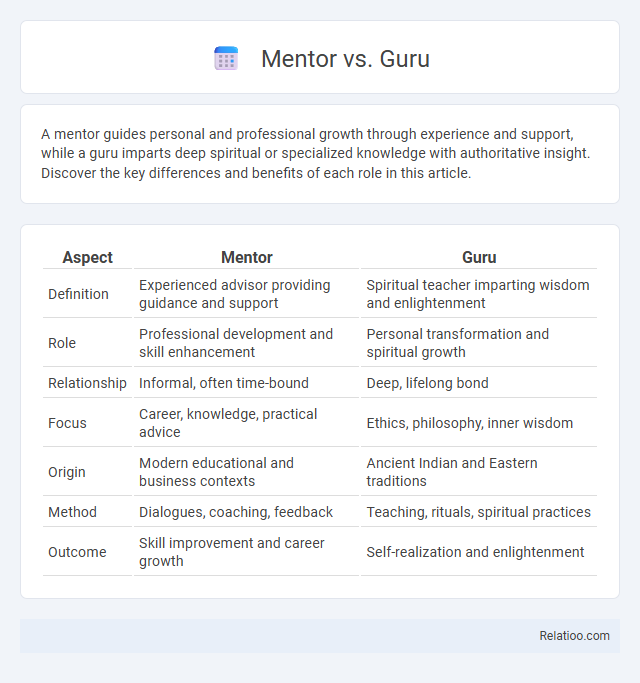A mentor guides personal and professional growth through experience and support, while a guru imparts deep spiritual or specialized knowledge with authoritative insight. Discover the key differences and benefits of each role in this article.
Table of Comparison
| Aspect | Mentor | Guru |
|---|---|---|
| Definition | Experienced advisor providing guidance and support | Spiritual teacher imparting wisdom and enlightenment |
| Role | Professional development and skill enhancement | Personal transformation and spiritual growth |
| Relationship | Informal, often time-bound | Deep, lifelong bond |
| Focus | Career, knowledge, practical advice | Ethics, philosophy, inner wisdom |
| Origin | Modern educational and business contexts | Ancient Indian and Eastern traditions |
| Method | Dialogues, coaching, feedback | Teaching, rituals, spiritual practices |
| Outcome | Skill improvement and career growth | Self-realization and enlightenment |
Mentor vs Guru: Key Differences
Mentors provide guidance based on experience and offer support for your personal and professional growth, focusing on practical advice and skill development. Gurus, however, are regarded as spiritual or philosophical teachers who impart wisdom and deeper understanding, often within a specific tradition or discipline. Your choice between a mentor and a guru depends on whether you seek actionable career mentorship or profound, transformative knowledge.
Origins and Definitions
Mentor originates from Greek mythology as a trusted advisor to Odysseus' son, representing guidance and wisdom in personal development. Guru, derived from Sanskrit, traditionally signifies a spiritual teacher who imparts deep knowledge and enlightenment in Indian culture. Mentor, in a modern context, emphasizes practical career coaching and support, distinguishing it from the spiritual connotations of a guru and the mythic origins of the term mentor.
Roles and Responsibilities
A mentor provides guidance and support by sharing personal experiences and offering practical advice to help you grow professionally and personally. A guru, often seen as an expert or spiritual teacher, imparts deep knowledge and wisdom, focusing on transformative learning and enlightenment. While both roles involve teaching, mentors emphasize development through real-world application, whereas gurus focus on profound insight and mastery.
Approaches to Guidance
Mentors provide practical, experience-based guidance tailored to Your personal and professional growth, emphasizing actionable feedback and skill development. Gurus offer deep, philosophical insights rooted in spiritual or traditional wisdom, encouraging self-discovery and inner transformation through teaching. Coaches focus on goal-oriented strategies and performance improvement by asking probing questions, enabling You to unlock potential and achieve specific objectives efficiently.
Relationship Dynamics
Mentor, Guru, and Coach roles differ significantly in relationship dynamics, with a mentor offering personalized guidance based on experience, fostering trust and long-term growth, while a guru provides authoritative knowledge often emphasizing spiritual or philosophical insight. A coach focuses on skill-building and performance improvement through structured feedback and goal-setting, creating a more transactional, goal-oriented interaction. Your ideal choice depends on whether you seek inspirational wisdom, practical advice, or targeted development within these relationship frameworks.
Methods of Knowledge Transfer
Mentors primarily use personalized guidance and experiential learning to facilitate knowledge transfer, focusing on practical skills and relationship-building tailored to Your growth. Gurus typically employ deep philosophical teachings and spiritual insights, emphasizing internal transformation through discourses and meditative practices. Masters combine structured instruction with mastery-based assessments, delivering specialized expertise through formal training and hands-on demonstration.
Impact on Personal Growth
Mentor, guru, and coach each play distinct roles in your personal growth by providing guidance, wisdom, and skill development. A mentor offers long-term support and experience-based advice to help you navigate challenges and achieve goals, while a guru imparts deep spiritual or philosophical insights that transform your mindset. A coach focuses on enhancing specific skills and performance, using targeted techniques and feedback to accelerate your progress.
Situational Suitability
Mentor, guru, and coach each serve distinct roles based on situational suitability, with mentors providing guidance through experience and long-term development, gurus offering deep expertise and profound wisdom often in spiritual or specialized fields, and coaches focusing on specific skill improvement and achieving short-term goals. Selecting a mentor suits situations requiring ongoing support and professional growth, while a guru aligns best with transformative learning in niche domains. Coaching is ideal when targeted performance enhancement and accountability are necessary in a structured timeframe.
Modern Applications in Career and Life
Mentor, Guru, and Coach each play distinct roles in modern career and life development, offering unique guidance tailored to your needs. A Mentor provides experienced insights and long-term career advice, a Guru serves as a deep spiritual or philosophical guide, while a Coach focuses on skill-building and performance improvement through structured techniques. Understanding these differences helps you leverage the right support system for professional growth and personal transformation.
Choosing Between a Mentor and a Guru
Choosing between a mentor and a guru depends on your learning style and goals; mentors provide personalized guidance and support based on experience, while gurus offer profound wisdom and spiritual insight often rooted in tradition. Your optimal choice aligns with whether you seek practical skill development or deeper philosophical understanding. Prioritize a mentor when you need actionable career advice, but turn to a guru for transformative personal growth.

Infographic: Mentor vs Guru
 relatioo.com
relatioo.com